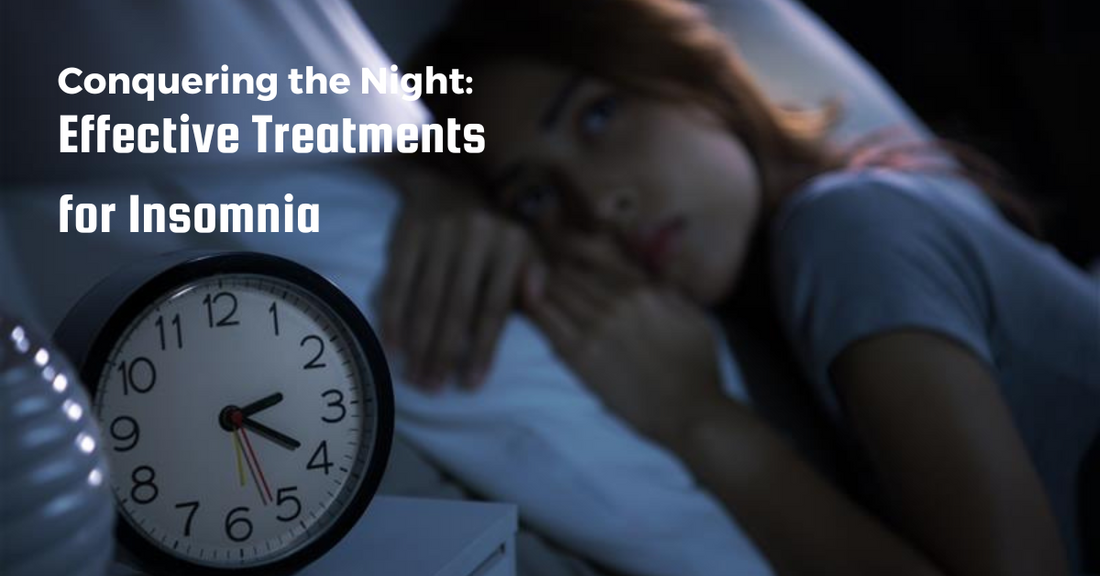
Conquering the Night: Effective Treatments for Insomnia
Share
Insomnia, the persistent inability to fall asleep or stay asleep, can leave you feeling drained, irritable, and foggy-headed. It disrupts your daily life and can contribute to several health problems. But the good news is, insomnia is treatable. There are various approaches you can take, from natural home remedies to professional interventions.
Table of Contents
- Understanding Insomnia: Types and Causes
- Can Insomnia Be Cured?
- Natural Remedies for a Restful Night's Sleep
- Treatment Options for Insomnia
- Alternative Therapies for Sleep
- When to See a Doctor?
- Conclusion
- Frequently Asked Questions
- Q: Should I see a doctor for insomnia?
- Q: What medications are used to treat insomnia?
- Q: Are there any natural remedies for insomnia?
- Q: I wake up in the night and can't fall back asleep. What should I do?
- Q: How long does it take to see results from treatment for insomnia?
- Q: I've tried everything and still can't sleep. What are my options?
Understanding Insomnia: Types and Causes
Insomnia can be categorized as acute or chronic. Acute insomnia is short-term and usually triggered by stress, travel, or illness. Chronic insomnia lasts for three months or longer and can significantly impact your daily life.
Here are some common causes of insomnia:
- Stress and anxiety: Worries and anxieties can keep your mind racing, making it difficult to unwind and fall asleep.
- Medical conditions: Pain, chronic illnesses, and hormonal changes can disrupt sleep patterns.
- Medications: Certain medications can have side effects that interfere with sleep.
- Lifestyle factors: Irregular sleep schedules, caffeine and alcohol intake close to bedtime, excessive screen time before sleep, and an uncomfortable sleep environment can all contribute to insomnia.
Can Insomnia Be Cured?
While there isn't a one-size-fits-all cure for insomnia, many people find significant relief through a combination of lifestyle changes, behavioural techniques, and sometimes medication. The key to successful treatment lies in identifying the underlying cause of your insomnia. Stress, anxiety, medical conditions, certain medications, and even poor sleep habits can all contribute.
Natural Remedies for a Restful Night's Sleep
Before diving into medication, lifestyle changes and natural remedies can be very effective in treating insomnia, especially for mild cases. Here are some tips to incorporate into your daily routine:
- Practice good sleep hygiene: Establish a consistent sleep schedule, go to bed and wake up at the same time every day, even on weekends. Create a relaxing bedtime routine that signals to your body it's time to wind down. This could include taking a warm bath, reading a book, or listening to calming music.
- Optimize your sleep environment: Make sure your bedroom is dark, quiet, cool, and clutter-free. Invest in blackout curtains, an eye mask, and earplugs if necessary.
- Develop a relaxing bedtime routine: Wind down for an hour or two before bed by avoiding stimulating activities like watching TV or using electronic devices. The blue light emitted from screens can suppress the production of melatonin, a hormone that regulates sleep-wake cycles.
- Regular exercise: Engage in regular physical activity, but avoid strenuous workouts close to bedtime. Exercise can help you fall asleep faster and sleep more soundly.
- Manage stress: Chronic stress is a major contributor to insomnia. Relaxation techniques like meditation, deep breathing exercises, and yoga can help reduce stress and promote better sleep.
- Limit caffeine and alcohol: While caffeine can give you a temporary energy boost, it can disrupt sleep later in the day. Avoid consuming caffeine in the afternoon or evening. Alcohol may initially make you feel drowsy, but it can fragment your sleep throughout the night.
- Create a sleep-wake schedule: If you find yourself waking up in the middle of the night and struggling to fall back asleep, avoid lying in bed awake for extended periods. Get out of bed and do a relaxing activity until you feel tired again. This will prevent you from associating your bed with frustration and wakefulness.
- Dietary modifications: Avoid heavy meals close to bedtime, as they can cause indigestion and discomfort that disrupts sleep. Conversely, going to bed hungry can also make it difficult to fall asleep. Opt for a light, healthy dinner a few hours before bedtime.
- Consider natural sleep aids: Certain natural supplements like melatonin, magnesium, and valerian root may help promote sleep. However, it's important to consult your doctor before taking any supplements to ensure they are safe for you and won't interact with any medications you're currently taking.

Treatment Options for Insomnia
If home remedies aren't providing enough relief, your doctor may recommend additional treatments:
- Prescription Sleep Medication: Medications like benzodiazepines or zolpidem can help you fall asleep faster. However, these medications should be used cautiously and for short periods due to the risk of dependence and side effects. Consult your doctor about the best course of medication for you.
- Over-the-counter Sleep Aids: Medications like melatonin or antihistamines with drowsiness-inducing properties can be helpful for occasional sleep problems. However, they may not be effective for long-term insomnia and can have side effects.
Alternative Therapies for Sleep
Some people find relief with alternative therapies like:
- Acupuncture: This traditional Chinese medicine practice involves inserting thin needles into specific points on the body. Studies suggest acupuncture may help improve sleep quality, although more research is needed.
- Light Therapy: If your insomnia is related to circadian rhythm disruptions, light therapy can help regulate your sleep-wake cycle. This involves exposure to bright light in the morning and avoiding bright light in the evening.
- Herbal Remedies: Certain herbs like hemp, chamomile and valerian root have shown some promise in promoting sleep. However, their effectiveness can vary, and it's important to consult your doctor before starting any herbal supplements, especially if you take other medications.

When to See a Doctor?
If your insomnia persists for several weeks despite trying home remedies, or if it's causing significant daytime fatigue or impacting your daily life, it's crucial to see a doctor. Early diagnosis and treatment can help prevent complications and improve your overall well-being.
Here are some signs that you should see a doctor for insomnia:
- Difficulty falling asleep most nights
- Waking up frequently during the night
- Waking up early and not being able to fall back asleep
- Feeling tired and irritable during the day
- Difficulty concentrating due to daytime fatigue
- Insomnia affecting your work, relationships, or social life
Your doctor will ask you about your sleep habits, medical history, and any medications you're taking. They may also perform a physical exam and recommend additional tests to rule out any underlying medical conditions.
Conclusion
Insomnia can be frustrating and disrupt your life, but it's important to remember that you're not alone. There are many effective treatment options available. By trying a combination of lifestyle changes, relaxation techniques, and potential medication under your doctor's guidance, you can reclaim a good night's sleep and wake up feeling refreshed and ready to take on the day.
Frequently Asked Questions
Q: Should I see a doctor for insomnia?
If your insomnia is frequent (happening most nights) and impacting your daily life, or if you suspect an underlying medical condition causing your sleep problems, it's important to consult your doctor.
Q: What medications are used to treat insomnia?
Prescription sleep medications can provide short-term relief, but they should be used cautiously and not as a long-term solution due to potential dependence and side effects. Your doctor will determine the best medication for your individual needs.
Q: Are there any natural remedies for insomnia?
Absolutely! Lifestyle changes and natural remedies can be very effective, especially for mild cases of insomnia. These include practising good sleep hygiene, creating a relaxing bedtime routine, managing stress, limiting caffeine and alcohol intake, and considering natural sleep aids like melatonin or magnesium (always consult your doctor before starting any supplements).
Q: I wake up in the night and can't fall back asleep. What should I do?
Avoid lying in bed awake for long periods. Get out of bed and do a relaxing activity like reading a book or listening to calming music in dim light until you feel tired again. This prevents associating your bed with frustration and wakefulness.
Q: How long does it take to see results from treatment for insomnia?
Developing healthy sleep habits takes time and consistency. Be patient with yourself. While some remedies may offer quicker relief, long-term solutions often take a few weeks to show significant improvement.
Q: I've tried everything and still can't sleep. What are my options?
If you've tried lifestyle changes and home remedies without success, consult your doctor. They can rule out any underlying medical conditions and explore further treatment options, such as cognitive behavioural therapy for insomnia (CBT-I), which can be very effective for chronic insomnia.
